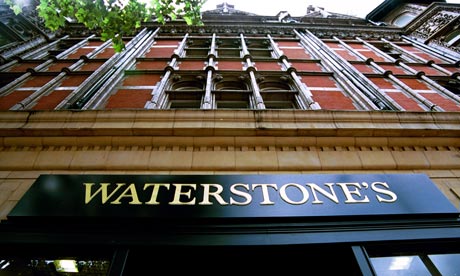Despite masterminding International Apostrophe Day, I am conserving my energy for the punctuation marks in greater need

Waterstones says dropping the apostrophe in its name makes it more versatile and practical. Photograph: Sarah Lee for the Guardian
You might think that, as the man behind last year's first International Apostrophe Day, I'd be joining the outcry about Waterstones' (note the apostrophe) decision to drop the apostrophe from its previous incarnation, Waterstone's, on the grounds that "Waterstones without an apostrophe is, in a digital world of URLs and email addresses, a more versatile and practical spelling".
But apart from my initial response – tweeting "we can only hope Waterstones knows its shit" – I haven't joined the uproar. In fact I am happy to confirm that, despite what you may have read in the Telegraph and elsewhere, the world has not come to an end.
The fact is that the way retailers choose to punctuate their name is a mess and certain to remain so. You have the "what's an apostrophe?" camp, of which the market leader is Tesco (colloquially known, ironically, as "Tesco's"); you may have noticed their line of boys toys.
In Tesco's defence, there never was a Mr Tesco, so a possessive apostrophe as in "Tesco's" would be illogical. There were a Marks and a Spencer, but luckily for us they also decided not to cause confusion by using apostrophes, although you do have to remember to employ the ampersand rather than "and" if you want to get Marks & Spencer (strictly, "Marks & Sparks") right.
Boots, Morrisons and now Waterstones eschew the apostrophe with less justification, as their shops were founded or developed and owned by, respectively, Jesse Boot, William Morrison and Tim Waterstone. (One of the motives of Waterstones' latest move, surely, is to further distance itself from its founder.)
Then there are the businesses that actually get it right, headed by Sainsbury's (as in Mr Sainsbury's shop) and McDonald's (as in Ronald McDonald's Egg McMuffins). The grey area occupied by Toys R Us's backward R we will leave for another time.
As many shopping centres boast a Tesco, a Morrisons, a Sainsbury's, a Marks & Spencer, a Waterstones and a McDonald's, it is hardly surprising that many young people, and greengrocers of all ages, find apostrophes so difficult. But however much the Apostrophe Protection Society huffs and puffs about it, these businesses are not going to change their orthography so we might as well get used to it and fight to save apostrophes where they are really needed: to aid communication and avoid ambiguity. The example in the Guardian style guide is:
my sister's friend's books (refers to one sister and her friend).
my sister's friends' books (one sister with lots of friends).
my sisters' friend's books (more than one sister, and their friend).
my sisters' friends' books (more than one sister, and their friends).
So if anyone tells you we don't need apostrophes, they are wrong. Another tip: always carry a large felt-tip pen and bottle of Tipp-Ex with you to add apostrophes to signs where appropriate and remove them from plurals. It will make you feel much better.
• The next International Apostrophe Day will be on Friday 17 August
But apart from my initial response – tweeting "we can only hope Waterstones knows its shit" – I haven't joined the uproar. In fact I am happy to confirm that, despite what you may have read in the Telegraph and elsewhere, the world has not come to an end.
The fact is that the way retailers choose to punctuate their name is a mess and certain to remain so. You have the "what's an apostrophe?" camp, of which the market leader is Tesco (colloquially known, ironically, as "Tesco's"); you may have noticed their line of boys toys.
In Tesco's defence, there never was a Mr Tesco, so a possessive apostrophe as in "Tesco's" would be illogical. There were a Marks and a Spencer, but luckily for us they also decided not to cause confusion by using apostrophes, although you do have to remember to employ the ampersand rather than "and" if you want to get Marks & Spencer (strictly, "Marks & Sparks") right.
Boots, Morrisons and now Waterstones eschew the apostrophe with less justification, as their shops were founded or developed and owned by, respectively, Jesse Boot, William Morrison and Tim Waterstone. (One of the motives of Waterstones' latest move, surely, is to further distance itself from its founder.)
Then there are the businesses that actually get it right, headed by Sainsbury's (as in Mr Sainsbury's shop) and McDonald's (as in Ronald McDonald's Egg McMuffins). The grey area occupied by Toys R Us's backward R we will leave for another time.
As many shopping centres boast a Tesco, a Morrisons, a Sainsbury's, a Marks & Spencer, a Waterstones and a McDonald's, it is hardly surprising that many young people, and greengrocers of all ages, find apostrophes so difficult. But however much the Apostrophe Protection Society huffs and puffs about it, these businesses are not going to change their orthography so we might as well get used to it and fight to save apostrophes where they are really needed: to aid communication and avoid ambiguity. The example in the Guardian style guide is:
my sister's friend's books (refers to one sister and her friend).
my sister's friends' books (one sister with lots of friends).
my sisters' friend's books (more than one sister, and their friend).
my sisters' friends' books (more than one sister, and their friends).
So if anyone tells you we don't need apostrophes, they are wrong. Another tip: always carry a large felt-tip pen and bottle of Tipp-Ex with you to add apostrophes to signs where appropriate and remove them from plurals. It will make you feel much better.
• The next International Apostrophe Day will be on Friday 17 August
No comments:
Post a Comment